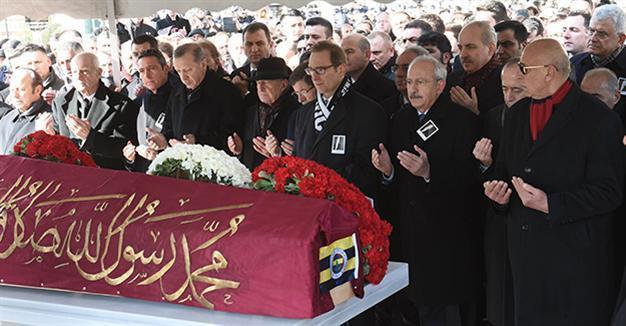Funeral held for Turkey’s leading businessman Mustafa Koç
ISTANBUL - Agence France-Presse

DHA Photo
Turkey’s leading businesspeople and politicians made a rare show of unity on Jan. 24 to turn out in force at the funeral of the chairman of Turkey’s largest industrial conglomerate, Mustafa Koç, who died last week aged only 55.
President Recep Tayyip Erdoğan, Prime Minister Ahmet Davutoğlu and main opposition Republican People's Party (CHP) leader Kemal Kılıçdaroğlu were among the mourners at the funeral at an Istanbul mosque for the Koç Holding CEO, who died on Jan. 21 after a massive heart attack.
Koç was the leader of the third generation of Koç Holding founded by his grandfather Vehbi Koç in the 1920s and which now has interests in energy, finance and autos.
Mustafa Koç took over as chief executive of Koç Holding in 2003 after the retirement of his father Rahmi Koç, now 85, who survives his son.
Rahmi Koç greeted the mourners along with his younger son Ali Koç in front of the coffin draped in a banner with an inscription in Ottoman Turkish script. The coffin also bore a ribbon from the family's favorite football team, Fenerbahçe.
Turkey's family-run conglomerates are the mainstays of the country's economy with interests in every sector. Koç Holding alone accounts for around nine percent of Turkish exports and eight percent of its GDP.
Prominent Turkish businessmen also made rare public appearances at the funeral.
"Mustafa Koç is an incredible loss. Look at the size of the crowds here," banking tycoon and founder of the FIBA holding Hüsnü Özyeğin told private broadcaster NTV.
Mustafa Koç was respected in business circles for presiding over sustained growth at Koç Holding. But he also won admiration from Turkish opposition after a major public tension between Koç and the AKP government in 2013 during the Gezi Park protests.
In one incident during the month-long anti-government demonstrations, protesters attempted to escape police tear gas and pepper spray by taking refuge in an Istanbul hotel, the Divan, owned by Koç. Hotel management admitted the protesters into its lobby, which quickly turned into a makeshift first aid room. A few days later, an angry Erdoğan said in a public rally, “We know which hotel owners helped the terrorists [protesters]. It is a crime to abet terrorists. And those crimes will not remain unpunished.”
Shortly after Erdoğan’s speech, tax police raided Koç’s refinery subsidiary, Tüpraş. Officials said it was a regular inspection. But in September 2013, the government’s executive committee that oversees defense procurement scrapped a $2 billion deal with Koç’s shipyards, RMK Marine, starting a new competition.
The Koç family chose to remain silent at the time. After a year after these developments, Mustafa Koç gave the following response in an exclusive interview with daily Hürriyet in March 2014: “We opted not to respond even though we were attacked a lot during and after Gezi. Fighting with our state does not suit us. Well, of course, we have brought our reputation to its current level in 90 years and we will not allow anybody to trample it. For this reason, we will defend our legal rights until the end against all false stories.”
Mustafa Koç was buried in the family plot at the Zincirlikuyu cemetery in Istanbul, next to his grandfather Vehbi Koç.
